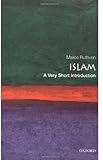The topic covered by Malise Ruthven is not free from controversy, to put it mildly. When I approach any work on a religious topic, I automatically become self-conscious and on the lookout. This is of course an understatement when it comes to Islam.

The pressure, whether real or perceived, on any author approaching this topic should already cast doubts as to whether or not the product is biased. I do not mean to imply that there is pressure one way or the other. It works both ways. On the one side there are those who think there is every reason to be aware of the threat caused by the rise of Islam and the progressing Islamization, and on the other those who call the first party Islamophobes and racist. It is therefore no surprise that the book had some very negative reviews. Perhaps another reason is that the topic is one that no two seem to completely agree on. In hindsight, this is reasonable. Scarcely can one find a topic as polarizing as religion.
Islam: A Very Short Introduction is unsurprisingly a short text on a complex and loaded topic. The author seems to be very capable and well-versed. Ruthven covers a large number of topics in a dense space. However, he also wastes some very valuable pages reflecting on the topic rather than presenting it. This would have been very welcome, if you asked me, if it wasn’t at the cost of core material.
This isn’t to say the book isn’t worth reading, far from it. The author does a good job of taking the reader on a tour of the religion from historic, cultural and traditional points to popular-opinion, controversies and even contemporary topics. However, it must be said that as prominent as the author is on the subject matter, he often fails to give the reader background on what he discusses. This might be the unintentional side-effect of trying to make the text interesting and non-linear. As an example, if any book should give a good introduction on Sunni and Shia and their differences, it should’ve been this book. Unfortunately, I found myself reading about them without prior introduction. While later in the book historic background shed some light on how these two groups came to be, it was only mentioned in passing and, without careful reading, the reader may feel a bit at loss as to how these two groups ended on opposite sides of an ongoing battle to this day. It may be the case that the author tried to avoid coming out as painting Islam as a polarized and battled religion.
Having been familiar with both the topic and many details of the subject matter, I can also add that the text was even-handed on most controversial topics. The author didn’t indulge in scenarios involving a complete takeover from extremists, rather, after pointing obvious concerns that most people within and without the Islamic hold. He discussed some recent movements towards reform and potential future trends. Of the cases mentioned were the women’s movement in Saudi Arabia for their right to acquire driver’s license (however that ended.)
Overall, the book is what it claims to be, with emphasis on the word very. The reader should be able to dive deeper into any of the many facets of this significant religion, thanks to the wide, albeit paper-thin, coverage done by Ruthven.
